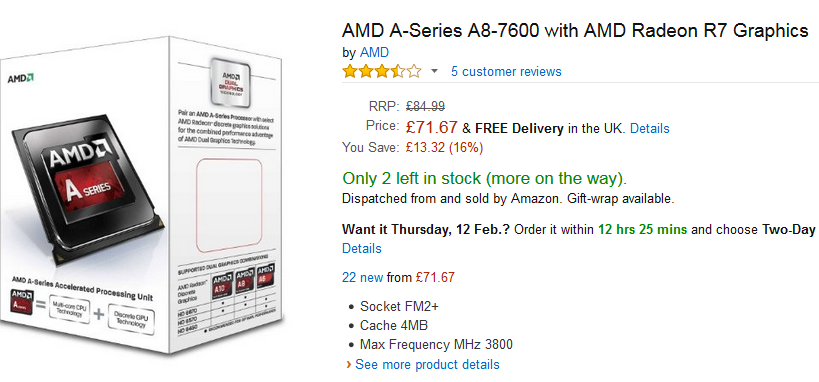Buyer Beware, Fake AMD CPUs May Be Selling On Amazon
Recently, shoppers on Amazon have reported fake AMD CPUs for sale.
The main CPU to watch out for is the AMD A8-7600. What appears to be happening is that customers are buying an AMD CPU from Amazon like normal, but when they receive the chips, the CPUs aren't working. Enough buyers looked closely at the bottom of the chips and realized that things just weren't matching up.
Apparently, someone is taking older or less expensive CPUs and delidding them. Then they are taking newer CPUs that have more value, delidding those, and then putting the IHS from the new CPUs on the old CPUs. Then they are able to sell them, and unless you look at the pins to realize that something is wrong, you would never notice.

According to Computer Base, a German news site, the cores being used are the AM2 Athlon X2 cores.
Currently, the fakes seem to be exclusive to the AMD A8-7600, and the situation appears to be limited to Amazon in the United Kingdom. However, users should be aware of potentially fake CPUs. The users did not report which seller they bought the product from, but all listings show up as new.
This could easily spread over to other products if the people behind it are successfully making a profit. For example, it would be relatively easy for someone to start doing this with Haswell products, switching the IHS of a Celeron with a Core i7, because both products are LGA1150.
It's a bad situation to be stuck in and not know what to do. Even worse, if you successfully manage to crush the CPU into the incompatible socket, it could cause serious damage to your motherboard.
Get Tom's Hardware's best news and in-depth reviews, straight to your inbox.
We reached out to both Amazon and AMD for comment. Although we have not heard from Amazon, AMD issued this response:
It is apparent that this isolated incident is not related in any way to AMD's manufacturing or packaging, however AMD takes any reports of product tampering very seriously. As part of our ongoing efforts to help ensure consumers and businesses are sold only genuine AMD processors, we thoroughly investigate these extremely rare incidents in an effort to determine the source of the altered products, and consider all available legal remedies - including both civil and criminal prosecution - against persons found to have engaged in fraudulent actions affecting AMD products. We are working in close cooperation with Amazon and the local enforcement authorities to conclude this incident quickly and ensure that the rigorous quality and reliability standards that AMD is known for are maintained. In addition, while AMD already implements extensive security measures to ensure the authenticity of our products, we are currently evaluating further measures to implement additional security measures for maximum future support.
An AMD representative would not confirm whether or not the fakes exist, but for what it's worth, we were told that this is an open investigation. However, AMD did offer some tips on how to check for a CPU's authenticity:
- Each AMD PIB has a unique serial number that helps AMD track distribution and helps ensure that buyers are receiving authentic AMD products of the highest quality.- Serial numbers are also used for verification of PIB authenticity for warranty service.- Each PIB has a 3D AMD hologram label on the box that helps users verify the authenticity of AMD PIB products.
AMD also has a guide listed on its website to help verify the legitimacy of CPUs.
Follow us @tomshardware, on Facebook and on Google+.
Seth Colaner previously served as News Director at Tom's Hardware. He covered technology news, focusing on keyboards, virtual reality, and wearables.
-
canadianvice If you buy from the marketplace. I only buy Amazon fulfilled or items under $20 on ebay. I've never been burned and have been refunded every time.Reply -
SirTrollsALot Ebay and Amazon rock! Its not their fault shady people take advantage of them... Though I prefer Ebay over Amazon, because the Ebay review system is better than Amazons... But then again I buy my computer stuff from fairly reputable sites like Tigerdirect or Newegg... And I make sure I know what I am buying... I feel bad for the people getting ripped off... But hopefully you learn from it...Reply -
I don't like Amazon anymore. Now that they allow anyone to open an Amazon store, each with different shipping policy etc, it just sucks.Reply
The worst is seeing 3-4 different listings for the same item, at a different price point, different shipping prices. It's like Aliexpress now. -
WRXSTIGuy Amazon also has Samsung micro SD cards that are counterfeit. They only write at 2-3MB/s and the files are corrupted. So much for trying to save $30. Won't make the same mistake again.Reply -
dstarr3 I remember a couple years ago, Amazon was having trouble with those coffee mugs that resemble big, expensive camera lenses. People would buy the $2,500 lenses, return the box with the coffee mug lookalike inside and get a full refund. Later someone else would spend $2,500 to get that coffee mug.Reply
Obviously Amazon took responsibility for it and sent them a lens once contacted, but still, that's a hell of a way for a company to lose thousands of dollars at a time. -
10tacle Amazon has a long record of having sellers sell counterfeit products. I got burned on Gillette Mach 3 razor cartridges many years ago.Reply -
captaincharisma in related news, victims of this scam don't mind it so much because they found they perform better than genuine AMD CPU's lol :)Reply -
John Bauer ReplyAmazon has a long record of having sellers sell counterfeit products. I got burned on Gillette Mach 3 razor cartridges many years ago.
Yeah, same here. When i built my first PC i bought a hyper 212+ off a seller on amazon.
When I got it in the mail it was in bits and pieces inside the box. Seller tried blaming shipping, but the box and product box were in perfect condition.
